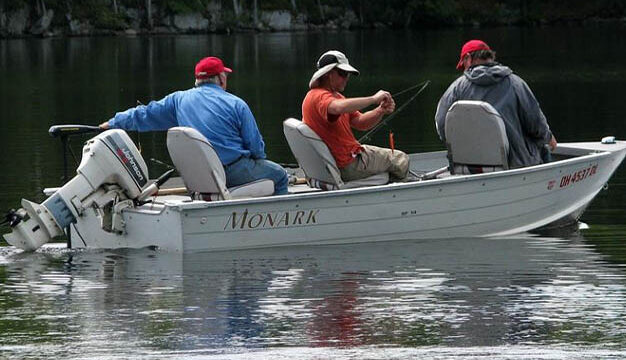Bass boating in saltwater You might imagine going fishing on a beautiful sunny day. However, your only reliable companion is a bass boat. You might wonder if your boat can be used in salt water after reading this.
As the name implies, salt water has a huge amount of salt in it. This salt can corrode some parts of your bass boat because it accelerates the rusting process. So using bass boats in saltwater could be dangerous.
Let’s talk about the damage salt water can do to your bass boat now.
What Is A Bass Boat?
Specifically designed for bass fishing, bass boats are flat fishing vessels. Since they are typically made of aluminum, they are both lighter and less expensive. A little heavier and more expensive models are made of fiberglass. Outboard motors with more power are typically installed in bass boats. Additionally, they frequently come with a variety of features that make fishing simpler. A rod box, insulated coolers, rod holders, circulating live well, and more are typically included.
A Bass Boat Can Go In Salt Water, Right?
Can you use a bass boat in salt water? Although a bass boat can be used in saltwater, it’s best to keep it in freshwater because many of its system’s components weren’t created to withstand the corrosive conditions of saltwater boating.
Bottom line: I would NEVER take a bass boat into saltwater, let alone out into the ocean. After boating for more than 30 years and getting caught in storms, I know some readers will disagree with me, but you have to always be ready for the worst.
Inlets can quickly become hazardous, even on a calm day. The waves may build up high and even form breakers like those you see crashing on the beach if the tide is going out and the wind is blowing in (or the other way around).
It’s likely that under those circumstances, if you’re in a bass boat, you won’t be able to pass back through the inlet.
Obvious Issues From Using A Bass Boat In Saltwater

Flooring
Most bass boats come equipped with carpeted floors as standard. It goes without saying that the carpet will get wet in either type of water, so that is not the issue. Carpet will retain saltwater for a lot longer than it will freshwater, which is a problem. As a result, the boat’s subfloor will rot because the saltwater underneath will rot the wood.
The Engine
If you’ve invested in an inboard-powered bass boat, you should be aware that going into saltwater with it is a terrible idea. Since saltwater isn’t the best environment for the metals used to make the motors, most boats that frequently travel in saltwater have motors with corrosion resistance features. Saltwater engines were designed to be durable for a reason, whether that be because the parts were coated in a corrosion-resistant coating, made of stainless steel, or both.
Because bass boats are intended for freshwater use, a motor for one was not constructed with these characteristics. You run the risk of damaging your bass boat if you take it out to sea if it has an internal or external motor. Before using an outboard motor in the ocean, you would need to switch it out for one that is saltwater friendly.
The Steering System
Bass boats do not have saltwater-compatible steering systems. Many of the parts in them aren’t made to withstand the corrosion that saltwater causes. such as hydraulics, cylinders, pivot arms, cables, knobs, etc. will all be destroyed by corrosion if you take your bass boat into saltwater. These issues won’t manifest themselves right away, but if you use your vehicle in salt water for a while, you’ll notice that your steering system begins to stall or freeze up completely. The best course of action is to switch out your steering for something designed to withstand salt water if you know you’ll be using your bass boat in saltwater for a prolonged period of time. The only way to stop corrosion from compromising your steering system is to undertake this expensive project.
The Electrical System
Saltwater will always have an impact on your electrical systems, regardless of the type of boat you have. With saltwater boats, extra care is taken to apply corrosion-resistant features to their electrical systems, such as coatings on wires and joints or waterproof casings all around. This upgrade is definitely not a bass boat standard because it is somewhat pricey. Bass boats are designed for freshwater use, so manufacturers don’t take the same precautions to protect the electrical system from saltwater as they do for saltwater-friendly vessels. You probably already guessed that corrosion would stop your electrical system from functioning properly if it were exposed to saltwater.
The Boats Hardware
Bass boats are typically constructed with metal hardware that has chrome plating, unlike boats that can withstand saltwater. Saltwater is not chrome’s friend, and it usually corrodes pretty quickly. Stainless steel is a common material in boats used in saltwater. The boat’s strong, corrosion-resistant bond can withstand the corrosive effects of saltwater thanks to stainless steel. You will start to notice corrosion on chrome hardware and embellishments if you use your bass boat in saltwater for an extended period of time. This can be a major issue because some chrome components, such as anchor cleats, door hinges, carpet trim, cleats, storage consoles, etc., are harmful to the use of bass boats.
The Trim Tabs
Most saltwater boats have trim tabs, a feature that gives them lift and makes up for changes in speed, weight distribution, and water conditions. This is useful because, if you are traveling through an area with waves, you can raise the trim tab to prevent the boat from colliding with the waves directly and filling with water. Bass boats obviously don’t have this kind of feature because there isn’t a situation in freshwater where it would be necessary for them. When you take your bass boat out on the water, you might run into some waves that are a little bigger and get soaked, which is obviously not good for a boat.
What Should I Do If I Still Want To Use A Bass Boat In Saltwater?
You’re in luck because used bass boats are affordable. One of the reasons you occasionally see them in saltwater is because they’re so inexpensive that you can simply dispose of them after they break down and replace them with more affordable, used bass boats.
That is, at least, how I see it.
What can you do to protect your bass boat and extend its lifespan if you decide to use it in saltwater?
Tips For Using A Bass Boat In Saltwater:
- Every time the engine is used, rinse it with fresh water. There are no exceptions at all.
- To completely rid the boat of salt and saltwater, wash all hardware and boat surfaces with soap and fresh water.
- Replace any carpet with a Sea Dek or other material that won’t trap moisture like carpet.
- After each use, all steering parts should be cleaned and lubricated. Yes, saltwater can quickly ruin the steering on your bass boat.
Are There Any Bass Boats Made For Saltwater Use?
What if there was a way to use a bass boat designed specifically for use in both freshwater and saltwater environments, giving you the best of both worlds when it comes to fishing? Don’t you think that would be fantastic?
So, are there bass boats designed for saltwater use? Yes, a lot of well-known bass boat manufacturers offer boats suitable for use in both freshwater and saltwater.
There is a boat out there that will meet your needs if you want a boat that can go anywhere and be used as a bass boat. Just be aware that it won’t be inexpensive!
They are more expensive because their parts are made to withstand the long-term effects of saltwater environments, but the extra money lets you use your boat in both fresh and saltwater.
Conclusion
Despite being foolish, it is possible to take your bass boat out on the open sea. Although freshwater bass boats cost around $15,000, properly preparing your boat for saltwater travel will cost you a few dollars.00 average, and if you don’t care about having to buy another one in a few months, you can just take it out as is. I don’t know about you, but I would rather not spend tens of thousands of dollars on a new bass boat if I don’t have to.
By giving your bass boat a thorough wash after use, you can definitely extend its lifespan. By doing this, you can remove all the saltwater and prevent it from corroding your motor and hardware. No matter what kind of boat you have, you must take this crucial step. After being in salt water, you should always rinse your boat.
If you want to use your bass boat on salt water, the best thing to do is to equip it properly or buy a bass boat that already has the features you need to survive in the salt water, such as trim tabs, stainless steel hardware, and salt water-friendly outboard motors.
However, I’m willing to concede that on a really calm day, you could drive your bass boat into the ocean. However, there are far more important things to be concerned about than just personal safety when boating.

